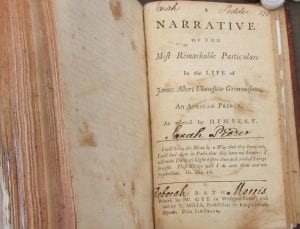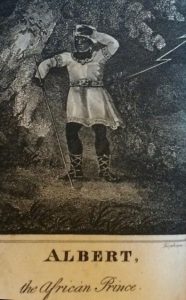Ukawsaw Gronniosaw wrote A Narrative of the Remarkable Particulars in the Life of James Albert Ukawsaw Gronniosaw, An African Prince. Gronniosaw went by James Albert like many he was given the name by his master. The section of his narrative covered in Black Writers in Britain 1760-1890 by Edwards and Dabydeen describes Gronniosaw’s life just before he was sold into slavery and then he takes us through the stages of his life from his different masters in slavery and then his freedom. He then covers his travels to Amsterdam and his experiences there up until his life in extreme poverty with his wife and children. His wife was a white woman who was a weaver and he states that from the moment he met her he knew he loved her, “the person that was weaving looked about and smiled upon us and I loved her from that moment”. His narrative was the first published in Britain by an African, showing just how significant he was as he was able to describe in his own words his experience and the hardships of his own life without being altered by a white person.
Religion is an important aspect of his narrative right from his experience of begging to be bought by a Dutch Captain on a slave ship where he states he said “Father, save me for I knew that if he did not buy me, I should be treated very ill” (page 10). And he also attributes God to him and his family being fed or for him getting employment when he was very desperate and describes him knowing that God will save them from starvation and poverty. He explains that he was “still hoping and believing that my God would not let us die but that it would please him to relieve us, which he almost did by miracle” (page 20). The people in Gronniosaw’s life taught him about God including his teacher that he had because he was sent to school by his master Mr Freelandhouse who was a minister, and who also taught him about God, “He took me home with him, and made me kneel down, and put my two hands together, and prayed for me”(page 12).
After these experiences and when he gained his freedom Gronniosaw headed to England but was very disappointed by the way Christians acted as he thought England was a Christian land he says, “I expected to find nothing but goodness, gentleness, and meekness in the Christian land, and I suffered great perplexity of mind at seeing so much wickedness.” (page 16). This shows just how he was taught to behave and what to believe as a Christian by his masters. It also must have been shocking to many British people who did not correlate Christianity with Black People at this point that he was devoted.
Overall, what Gronniosaw said in his narrative is very significant also as this would have been the first time for many reading it to hear experiences of slavery directly from an ex-slave. However, his continuous mentioning of religion is not too unsurprising as this was one of the main purposes of his narrative, to show slaves that were heavily connected to God, and that they did not need to be free to experience god’s love by converting to Calvinism. This is due to his narrative being paid for by Selina Hastings, Countess of Huntington, who was very involved in the Calvinist connexion. Due to this we have to be careful when interpretating Gronniosaw’s narrative as Calvinist beliefs suggested that slavery was a good thing as it allowed Africans to be taught about God.

A copy of “A Narrative of the Most Remarkable Particulars in the Life of James Albert Ukawsaw Gronniosaw” on display at the International Slavery Museum of London

Dear Amy this is a well detailed blog which analyses the Gronniosaw extract well. You rightly identify the important role of Christian faith for Gronniosaw. You have also included some direct quotation to illustrate his views, At the end you mention that Gronniosaw’s book was sponsiored by the Duchess of Huntingdomn. You should also discuss who wrote down Gronniosaw’s life story and make it clear from the start of your post that he did not write it; which may influence its authenticity.